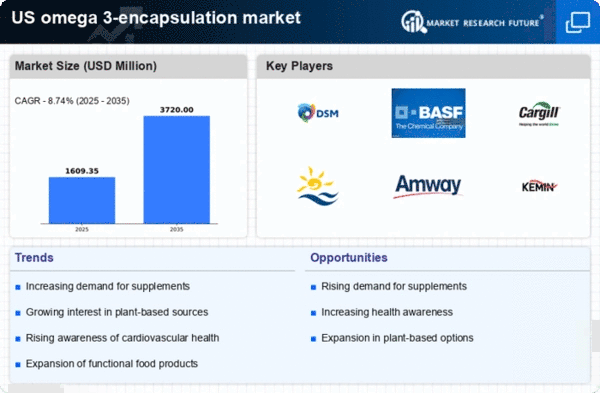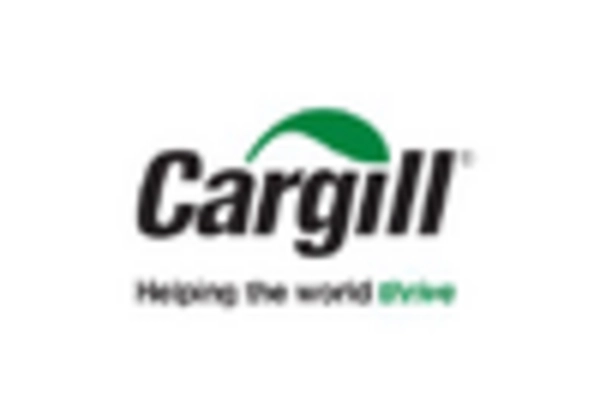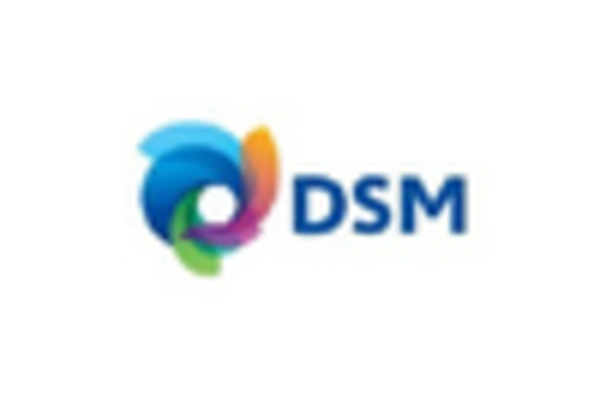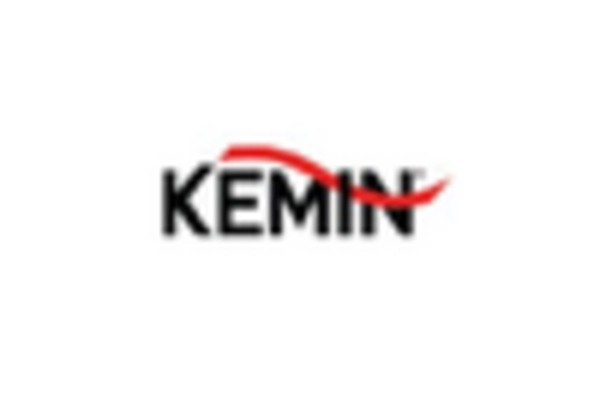Growth of Functional Foods
The omega 3-encapsulation market is significantly influenced by the expanding segment of functional foods. As consumers increasingly seek foods that offer health benefits beyond basic nutrition, the incorporation of omega 3 fatty acids into everyday products becomes more prevalent. The functional food market in the US is projected to grow at a CAGR of 8% over the next five years, with omega 3-enriched products leading the charge. This growth is attributed to the rising popularity of fortified foods, such as dairy products, snacks, and beverages, which are designed to support specific health outcomes. The omega 3-encapsulation market is thus poised to capitalize on this trend, as manufacturers explore new formulations that integrate omega 3 oils into various food matrices while maintaining their efficacy and taste.
Increasing Health Awareness
The omega 3-encapsulation market is experiencing growth driven by a notable increase in health awareness among consumers. As individuals become more informed about the benefits of omega 3 fatty acids, including their role in cardiovascular health and cognitive function, demand for encapsulated products rises. According to recent surveys, approximately 70% of consumers in the US actively seek dietary supplements that promote overall wellness. This trend is particularly pronounced among health-conscious demographics, such as millennials and older adults, who prioritize preventive health measures. Consequently, manufacturers are responding by developing innovative encapsulation technologies that enhance bioavailability and stability of omega 3 oils, thereby expanding their market reach. The omega 3-encapsulation market is thus positioned to benefit from this heightened consumer focus on health and nutrition.
Sustainability Concerns in Sourcing
The omega 3-encapsulation market is increasingly influenced by sustainability concerns regarding the sourcing of omega 3 fatty acids. As consumers become more environmentally conscious, there is a growing demand for sustainably sourced omega 3 products, particularly those derived from algae or responsibly harvested fish. This shift is prompting manufacturers to adopt transparent supply chain practices and invest in sustainable sourcing initiatives. According to industry reports, approximately 60% of consumers in the US express a preference for products that are certified as sustainable. The omega 3-encapsulation market is thus responding by developing encapsulation methods that not only preserve the quality of omega 3 oils but also align with eco-friendly practices, thereby enhancing brand loyalty and market competitiveness.
Rising Popularity of Personalized Nutrition
The omega 3-encapsulation market is increasingly shaped by the trend towards personalized nutrition. As consumers seek tailored dietary solutions that align with their individual health needs, the demand for omega 3 supplements that cater to specific conditions, such as inflammation or heart health, is on the rise. This shift is supported by advancements in technology that allow for the customization of supplement formulations based on genetic, lifestyle, and health data. The personalized nutrition market is expected to grow substantially, with projections indicating a CAGR of 10% over the next five years. Consequently, the omega 3-encapsulation market is likely to adapt by offering more targeted products that leverage encapsulation techniques to enhance absorption and effectiveness, thereby appealing to a broader consumer base.
Regulatory Support for Nutritional Supplements
The omega 3-encapsulation market benefits from favorable regulatory frameworks that support the use of nutritional supplements. In the US, agencies such as the FDA provide guidelines that facilitate the incorporation of omega 3 fatty acids into dietary supplements, thereby encouraging innovation within the industry. Recent legislative efforts have aimed to streamline the approval process for new omega 3 products, which could potentially enhance market entry for emerging brands. This regulatory support is crucial, as it fosters a competitive environment where companies can invest in research and development of advanced encapsulation technologies. As a result, the omega 3-encapsulation market is likely to see an influx of new products that meet consumer demands for quality and efficacy, further driving market growth.
















